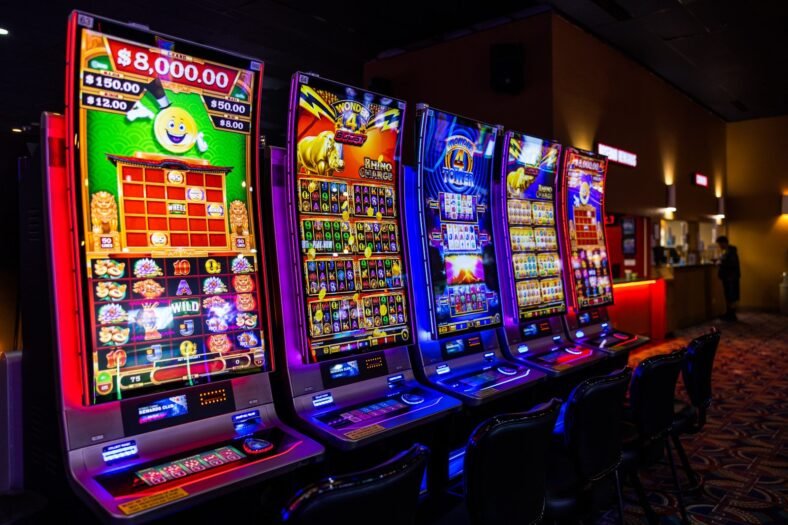The way we engage with and enjoy games is always changing due to technological advancements in the dynamic world of online gaming. The introduction of augmented reality (AR) is set to drastically change online slots, a staple of online casinos. Beyond the conventional reels and paylines, this cutting-edge technology promises to increase user engagement and offer a more immersive gaming experience. Let’s examine how augmented reality can transform online slots, enhancing their interactivity, player rewards, and overall appeal.
The Present Online Slots Environment
The traditional slot machines used in land-based casinos have been digitally transformed into online versions. These games have developed from simple three-reel layouts to intricate games with several paylines, elaborate themes, and an abundance of additional features. From sports and adventure to fantasy and historical civilizations, players can enjoy a vast variety of games in the comfort of their own homes.
Online slots have been mostly constant over the years, despite their popularity; the two biggest changes have been the addition of olympus video slots and graphic upgrades. The basic gameplay, which centres on matching symbols and spinning reels, hasn’t changed, either.
Presenting Augmented Reality: A Whole New Gaming Experience
By fusing digital and physical content, augmented reality adds a new level of interaction. By overlaying digital components over the real world, augmented reality (AR) improves it, in contrast to virtual reality (VR), which produces an entirely fabricated environment. This technology offers enhanced experiences that smoothly merge the real and virtual worlds, and it has already made major strides in a number of industries, including retail, education, and healthcare.
With online slots, augmented reality (AR) can be used to create a three-dimensional gaming environment where the player can see the reels and other gaming features projected into their physical surroundings. Players will be able to engage with the game in ways that were previously unthinkable thanks to the use of cellphones, AR glasses, or other gadgets to accomplish this.
AR’s Possible Effect on Player Experience
Augmented reality in online slots has the potential to significantly change the player experience in a number of ways.
Improved Engagement and Communication
By adding interactive components that players may interact with in real space, augmented reality technology can enhance the immersive experience of slot games. For instance, gamers may reach out and “pull” a virtual lever to spin reels on a screen in place of pressing a button. An additional layer of excitement and engagement that improves the standard slot experience could come from bonus games that require players to physically interact with things that appear in the room.
Customised Video Games
Players could alter their gaming environment with augmented reality to suit their tastes. Consider altering the background of a slot machine to your favourite holiday location or your living area. In addition to improving the game’s aesthetic appeal, this personalisation would make playing it more cosy and pleasurable.
Features of Social Interaction
AR may also bring about fresh opportunities for player interaction. It is possible to create multiplayer formats that allow players to share a virtual gaming space and view one other’s avatars even while they are physically apart. This could contribute to the communal aspect of online slots by simulating the social ambiance of a casino floor.
Technical Difficulties and Their Resolutions
Although augmented reality (AR) has a lot of potential for online slots, there are a few technological issues that need to be resolved before this can happen. These include managing the growing data demands, guaranteeing real-time performance, and developing applications that are universally compatible with a wide range of hardware and operating systems.
Nevertheless, improvements in cloud computing, quicker internet access, and the creation of more potent augmented reality gadgets are assisting in overcoming these obstacles. Additionally, to make AR material more accessible and possible to integrate into online slots, software developers and game developers are investing in new tools and platforms.
Prospects for the Future: What’s in Store
The potential applications of augmented reality (AR) technology in online slots and other types of online gambling are essentially endless as the technology develops and gains popularity. In the future, games may become even more lifelike and captivating, complete with features that let users engage with and explore a virtual slot machine, so creating a completely interactive gaming environment that dissolves the boundaries between the real and virtual worlds.
In summary
The way we play online slots could be completely altered by augmented reality, which would make the games more engaging, entertaining, and immersive. We may anticipate a new era in online gaming as technology develops, one in which we can enjoy the excitement of a casino from the comfort of our own homes in a whole new way. The adventure beyond the reels is just getting started, and it seems like a lot of fun.

